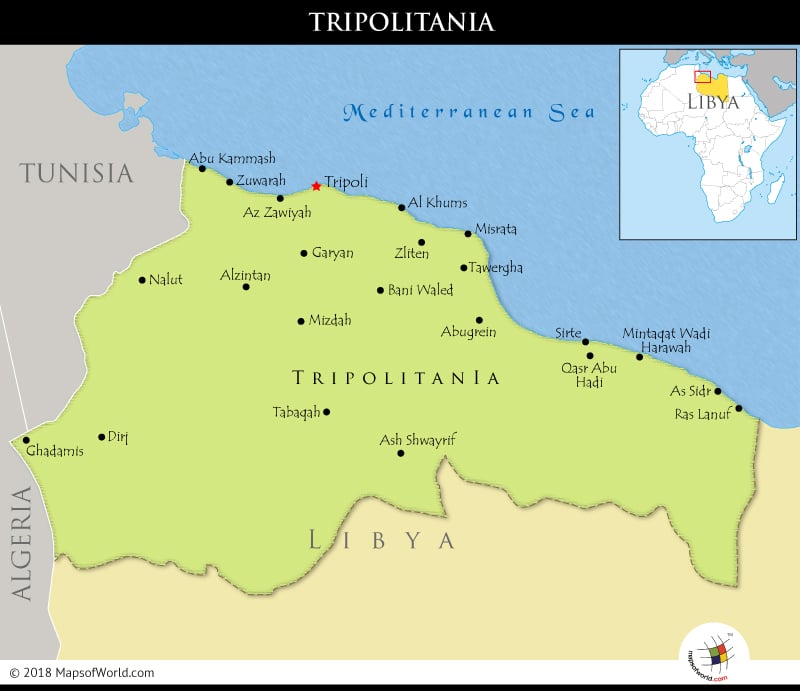What region was known as Tripolitania?
As part of the three administrative divisions within Italian Libya, Tripolitania was a historic region and a former province of the Kingdom of Libya, from a period of 1934 to 1963. Prior to this, in 1927 to 1934, Tripolitania was a separate Italian colony. The other two divisions, alongside with Tripolitania were Cyrenaica to the east and Fezzan to the south. The conquest by Italy in the Italo-Turkish War, united them as a single political unit.
In the ancient times, the region included Tripoli, the capital city and the largest city of Libya. Expanding over the northwestern portion of Libya, the region of Tripolitania, was relatively larger than the current day Shabiyah (district) of Tripoli. Hence, the region of Tripolitania holds an extensive historic value. The Shabiyat system, as the administrative system of Tripolitania, had replaced the former Baladiyat system of municipalities. The administrative division of Tripolitania was the most populous of the three divisions. With the majority of the population belonging to the Arab-Berber ancestry, the communities were of the Berber-speaking origin. Some of the most important cities of Tripolitania were: Misrata, Zawiya, Gharyan, Khoms, Tarhuna and Sirte.
The City of Oea, which existed in place of the modern-day Tripoli, was founded by Phoenicians, in 7th century BC. It was then conquered by the Greek rulers of Cyrenaica. It was in 146 BC., that the Roman Republic captured Tripolitania and the latter flourished and prospered. The medieval ages, saw the Islamic conquest over the region. The Islamic rule started in the 7th century, with Arab invasions into Pentapolis, Cyrenaica, encountering little resistance. Tripolitania was conquered by the Rashidun Caliphate and was inherited by his descendants. This was followed by a period of transfer of control over the region to an Almohad vassal and then to Hafsids, until the region was finally conquered by The Ottoman Empire in 1553.
The Ottoman Tripolitania spread across the region of Tripolitania and Cyrenaica. The Karamanli dynasty, ruled Tripolitania from 1711 to 1835, consisting of the current day Tripoli and neighboring areas in Libya. Tripolitania had become effectively independent under the rule of Karamanli dynasty. The ottoman rule was hence re-imposed in 1835, persisting till 1912. The triumph of Italy in the Italo-Turkish war between 1911-1912, resulted in the capturing of Tripolitania by Italy. The war was fought between Ottoman Empire and the Kingdom of Italy. The Italian Tripolitania constituted the Northwestern half of Libya, with Tripoli as the prime city. Various infrastructure projects were taken up by the Italian invaders. Some of them were the development of coastal roads and the railways, and expanding the port of Tripoli.
It was only after World War I, the independence of Tripolitania from Italian Libya was declared, with the ‘Tripolitanian Republic’. The formal declaration of the state was carried out at the 1919 Paris Peace Conference (Treaty of Versailles).
Tripolitania was a stage of fierce fighting between the British and the German, during World War II. The region fell under the direct administration of the British Military Administration. The three provinces of Tripolitan, Cyrenaica, and Fezzan, consequently formed the independent federal kingdom of Libya, in 1951. Libya became a unitary state and the administratively abolished them in 1963.
The Italian settlers in Tripolitania played a role in its economic sector but were largely illiterate and politically apathetic. Additionally, the close proximity to the border areas of Tunisia, had impacted the migration trends. In the contemporary times, no natural frontier marks the border, with identical ethnic composition, language, value systems and traditions of the two regions.
Know more:
Related maps:




